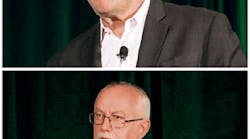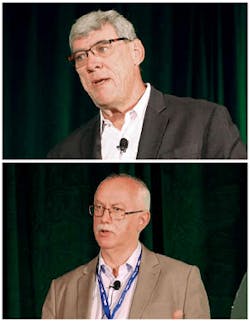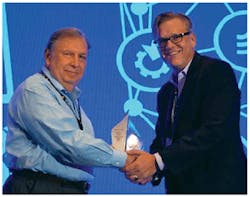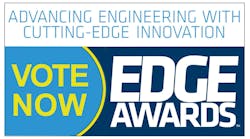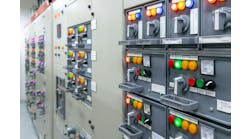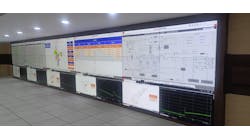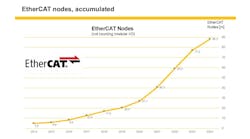"Our customers are asking us to understand the full value of their automation investments throughout an asset's lifecycle," says Gary Freburger (top), president of Schneider Electric's Process Automation business, at the opening of the 2018 Foxboro User Group conference. "We improve continuity of service by anticipating failures with process and device diagnostics, which reduces downtime," adds Alain Ginguene (bottom), director of Schneider Electric's global offer management for EcoStruxure Foxboro DCs.
As the pace of business continues to accelerate along with seemingly exponential growth in digital innovations, Schneider Electric reports it's uniquely positioned to safely drive measurable operational profitability improvement on behalf of its process industry customers. This was the message delivered by Gary Freburger, president of the company’s Process Automation business, in his kick-off address to attendees at the 2018 Foxboro User Group conference on Aug. 6-9 in San Antonio, Texas.For instance, EcoStruxure Plant portfolio encompasses everything from instrumentation to edge devices, such as controllers, to a broad range of applications, analytics and services. “But the real measure of these technologies is how well we turn them into something meaningful for you,” said Freburger.
Central to Schneider's value proposition is the disciplined conversion of variables that once could only be managed into real-time control domains. “For example, asset performance management is an important function, but this traditional term entails a reactive approach,” he added.
Instead, the company proposes that its customers do asset performance control. “It’s a new approach to asset performance and represents a shift to real-time control across your entire value chain,” he explained. These other value-chain parameters include efficiency, reliability, safety, security and ultimately profitability. “We have an unprecedented portfolio. But even more importantly we can close the loop on all of this,” said Freburger. “At the end of the day, it’s all about how can we help you drive profitability and better return on investment.”
Lifecycle integration
Another key differentiator of Schneider Electric's offering is the integration of its EcoStruxure Plant platform with the plant design software tools of Schneider-controller sister company AVEVA. This integration allows the company to holistically address both capital expenditure (CapEx) and operational expenditure (OpEx) implications of design decisions early on and throughout a plant’s full lifecycle.
“It’s a 'TotalEx View,' ” said Freburger. “Our customers are asking us to understand the full value of their automation investments, not just at the project phase but throughout an asset’s lifecycle.” Other key demands include ensuring the security of entire system and facility, the support of system performance support, empowering the workforce to drive value, measurably improving operational profitability while ensuring safety, and showing the value of the IIoT and digitalization.
“Our vision is that your industrial automation investment will become the profit engine of your business,” added Freburger. “Digitalization activates and empowers you to drive business value, and the EcoStruxure Foxboro DCS will continue to evolve as our next-generation solution for real-time efficiency, reliability, safety and profitability control.”
Herman Storey (left), CTO at Herman Storey Consulting LLC in Kingwood, Texas, receives his award officially inducting him into the Control Process Automation Hall of Fame from Keith Larson (right), VP of content at Putman Media, on Sept. 13 during the Yokogawa User Conference North America 2018.
Also presenting during the opening keynotes, Alain Ginguene, Schneider Electric’s director of global offer management for EcoStruxure Foxboro DCS, added that, "EcoStruxure Foxboro DCS is a comprehensive portfolio of distributed control capabilities for powering the new digitalized economies. These capabilities cover both capital-expenditure (CapEx) and operational-expenditure (OpEx) projects, digital-twin simulation initiatives and Schneider Electric services, such as Flexible Execution (FLEX), Intelligent Power and Motor Control Center (iMPCC) and others."Ginguene explained, "Schneider Electric's approach to CapEx and OpEx means we don't just ship a product one day, but instead get involved with users starting at the design stage, help them build and commission it, operate and maintain it throughout its lifecycle, and eventually decommission it. This is where the value of a complete solution like EcoStruxure Foxboro DCS and all its tools come in."
On the CAPEX side where design and construction are the goals, Schneider Electric's solutions come from the AVEVA software portfolio. However, as users and their projects move toward startup and operations, Schneider Electric's historian, process automation system (PAS), and planning and scheduling tools start to take the reins. The other part of this OpEx phase is maintenance, where users implement Schneider Electric's enterprise asset management (EAM) software.
"Because about 30% of work on projects is actually rework, we stress on both the CAPEX and OPEX sides identifying and doing only work that's useful," added Ginguene. "For instance, our vision for FLEX simplifies the steps in a project, but it also enables different participants to work in parallel, so they can finish more quickly and avoid former rework."
